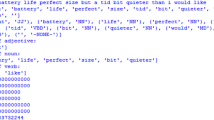Abstract
Social networking and micro-blogging sites are stores of opinion-bearing content created by human users. Sentiment analysis extracts and measures the sentiment or “attitude” of documents as well as the topics within documents. The attitude may be the person’s judgment (e.g., positive vs. negative) or emotional tone (e.g., objective vs. subjective). In this paper we define a supervised learning solution for sentiment analysis on twitter messages which gives profound accuracy using Naïve Bayes Classification. It classifies the tweets either positive or negative. Our dataset consists of tweets containing move reviews retrieved from twitter using certain keywords on a cloud platform. The experiment and analysis has 3 major steps. In the first step, the algorithm used is Naïve Bayes which performed Boolean classification on bag of words, resulting in 71 % of accuracy. In the second step, Naïve Bayes algorithm is applied on bag of words without stop words which gave 72 % accuracy. In the third step, using the concept of Information gain, high value features are selected using Chi Square, which gave maximum accuracy. The evaluating metrics used in this work are Accuracy, Precision, Recall and F-Measure for both the sentiment classes. The results show that Naïve Bayes algorithm with the application of feature selection using the minimum Chi Square value of 3 gave an Accuracy of 89 %, Positive Precision 83.07 %, Positive Recall 97.2 %, Positive F-Measure 89.9 %, Negative Precision 96.6 %, Negative Recall 81.2 % and Negative F-Measure 88.2 %. The significant increase in Positive Recall specifies that the classifier classifies positive words with more probability when compared to the negative words. This paper also describes the preprocessing steps needed in order to achieve high accuracy.
Access this chapter
Tax calculation will be finalised at checkout
Purchases are for personal use only
Preview
Unable to display preview. Download preview PDF.
Similar content being viewed by others
References
Hussain, A.R., Hameed, M.A., Hegde, N.P.: Mining Twitter using Cloud Computing. In: World Congress on Information and Communication Technologies, pp. 187-190 (2011)
Pang, B., Lee, L.: Opinion Mining and Sentiment Analysis. In: Foundations and Trends in Information Retrieval (2008)
Das, S.R., Chen, M.Y.: Yahoo! for Amazon: Sentiment Extraction from Small Talk on the Web. In: Management Science, pp. 1375-1388 (2007)
Forman, G.: An extensive empirical study of feature selection metrics for text classification. In: The Journal of Machine Learning Research, pp. 1289-1305 (2003)
Rennie, J.D.M, Shih, L., Teevan, J., Karger, D.R.: Tackling the Poor Assumptions of Naïve Bayes Text Classifiers. In: Proceedings of the Twentieth International Conference on Machine Learning, pp. 616-63 (2003)
Agarwal, A., Xie, B., Vovsha, I., Rambow, O., Passonneau, R.: Sentiment Analysis of Twitter Data. In: Proceedings of the Workshop on Languages in Social Media, pp. 30-38 (2011)
Jiang, L., Yu, M., Zhou, M., Liu, X., Zhao, T.: Target-dependent Twitter sentiment classification. In: Proceedings of the 49th Annual Meeting of the Association for Computational Linguistics: Human Language Technologies, pp. 151-160 (2011)
Pandey, V., Iyer, C.: Sentiment analysis of microblogs. Technical Report, Stanford University (2009)
Lewin, J. S., Pribula, A.: Extracting Emotion from Twitter. Technical Report, Stanford University (2009)
Pang, B., Lee, L., Vaithyanatan, S.: Thumbs up?: sentiment classification using machine learning techniques. In: Proceedings of the ACL-02 conference on Empirical methods in natural language processing, pp. 79-86 (2002)
Author information
Authors and Affiliations
Corresponding author
Editor information
Editors and Affiliations
Rights and permissions
Copyright information
© 2013 Springer India
About this paper
Cite this paper
Fouzia Sayeedunnissa, S., Hussain, A.R., Hameed, M.A. (2013). Supervised Opinion Mining of Social Network Data Using a Bag-of-Words Approach on the Cloud. In: Bansal, J., Singh, P., Deep, K., Pant, M., Nagar, A. (eds) Proceedings of Seventh International Conference on Bio-Inspired Computing: Theories and Applications (BIC-TA 2012). Advances in Intelligent Systems and Computing, vol 202. Springer, India. https://doi.org/10.1007/978-81-322-1041-2_26
Download citation
DOI: https://doi.org/10.1007/978-81-322-1041-2_26
Published:
Publisher Name: Springer, India
Print ISBN: 978-81-322-1040-5
Online ISBN: 978-81-322-1041-2
eBook Packages: EngineeringEngineering (R0)




